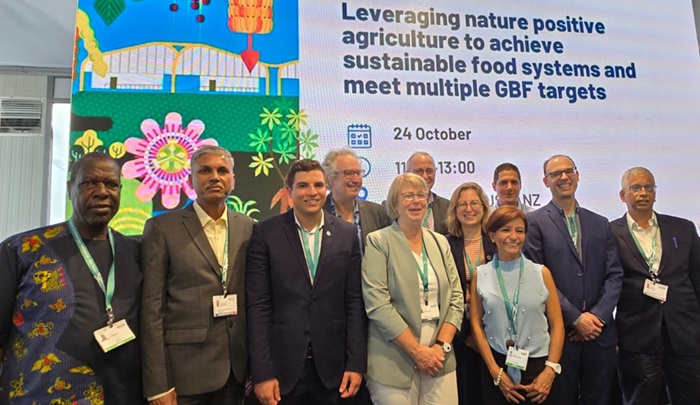[et_pb_section fb_built=”1″ _builder_version=”4.21.0″ background_enable_color=”off” global_colors_info=”{}”][et_pb_row _builder_version=”4.21.0″ _module_preset=”default” custom_margin=”-20px||||false|false” global_colors_info=”{}”][et_pb_column type=”4_4″ _builder_version=”4.21.0″ _module_preset=”default” global_colors_info=”{}”][et_pb_text _builder_version=”4.21.0″ _module_preset=”default” text_orientation=”justified” custom_margin=”||||false|false” global_colors_info=”{}”]
BAIF Development Research Foundation, Pune, an accredited Observer Organization of the United Nations Convention on Biological Diversity (UNCBD), participated in the 16th meeting of the Conference of the Parties (COP16) in Cali, Colombia from October 22 to 26, 2024.
[/et_pb_text][et_pb_text _builder_version=”4.21.0″ _module_preset=”default” text_orientation=”justified” custom_margin=”-10px||||false|false” global_colors_info=”{}”]
BAIF Representatives Mr. Pramodkumar Takawale and Mr. Sudhir Wagle were invited to attend side events on mitigating the agricultural drivers of biodiversity loss, leveraging nature positive agriculture to achieve sustainable food system and meet multiple GBF targets and making the case for ecological benefits: community language for nature positive solutions. They highlighted BAIF’s native crop diversity conservation in conjunction with livelihood enhancement models of livestock development, climate-resilient agri-horti-forestry water-centric land degradation neutrality initiatives and promotion of rural enterprises, green and renewable energy for achieving sustainable and resilient agri-food systems. They also shared BAIF’s collaborative project for implementing Nature Positive Solutions in Maharashtra state of India in collaboration with the Alliance Bioversity and CIAT, other CGIAR partners. BAIF elaborated various Nature-based Solutions adopted by it to conserve, manage, restore and recycle with focus on six “C” approaches of agrobiodiversity, integration of livestock in farming system for sustainability, circularity, livelihood, climate resilience and building ecosystems.
[/et_pb_text][et_pb_image src=”https://clone.baif.org.in/wp-content/uploads/2024/10/COP-16.jpg” title_text=”COP-16″ align=”center” _builder_version=”4.21.0″ _module_preset=”default” hover_enabled=”0″ global_colors_info=”{}” custom_margin=”-10px||||false|false” sticky_enabled=”0″][/et_pb_image][et_pb_image src=”https://clone.baif.org.in/wp-content/uploads/2024/10/COP16-1.jpg” title_text=”COP16-1″ align=”center” disabled_on=”on|on|on” _builder_version=”4.21.0″ _module_preset=”default” disabled=”on” global_colors_info=”{}”][/et_pb_image][et_pb_text _builder_version=”4.21.0″ _module_preset=”default” text_orientation=”justified” custom_margin=”-10px||||false|false” global_colors_info=”{}”]
The thematic discussions organised by CGIAR focussed on the benefits of adopting nature-positive agriculture for achieving the Global Biodiversity Framework (GBF), adapted to local conditions and cultures and the challenges and opportunities for scaling up these approaches across regions. The participating organisations unanimously agreed that global challenges posed by industrial agriculture had put to risk the nutrition and livelihoods of millions of smallholder farmers and that it was only nature-positive approaches leveraging traditional knowledge and innovative technologies and practices which could restore the health of the ecosystem, build resilience against climate change and conserve biodiversity. It was evident from the presentations at COP16 that community-based solutions for nature and climate action by indigenous people and local communities have been leading efforts in agrobiodiversity conservation in various countries. A discussion on multilateral collaboration for a regional biodiversity conservation was also focussed on.
[/et_pb_text][et_pb_text _builder_version=”4.21.0″ _module_preset=”default” text_orientation=”justified” custom_margin=”-10px||||false|false” global_colors_info=”{}”]
BAIF delegation engaged in discussions with representatives of several global programmes and donor agencies that will help expand our pro-livelihood and climate action programmes while protecting the precious biodiversity of the country.
[/et_pb_text][/et_pb_column][/et_pb_row][/et_pb_section]

